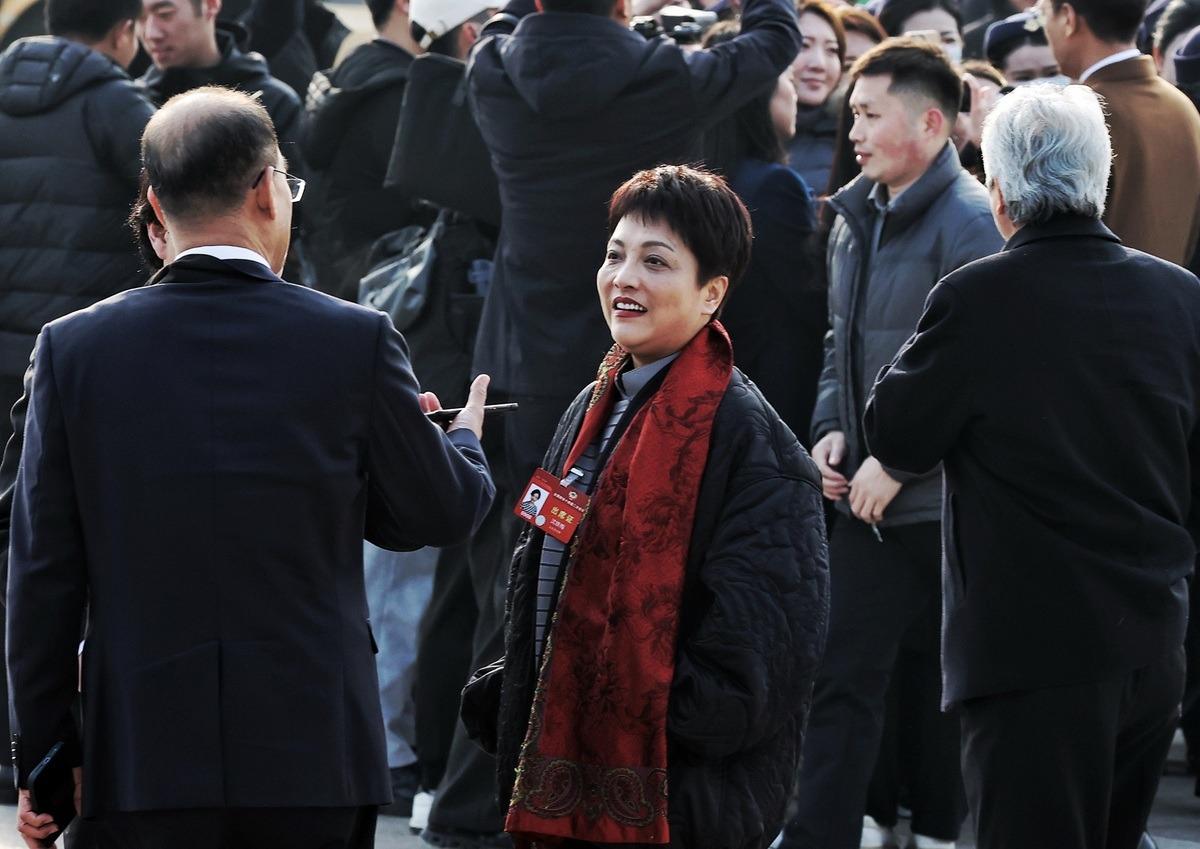More women now members of NPC and CPPCC National Committee
 Members of the 14th National Committee of the Chinese People's Political Consultative Conference (CPPCC) talk with each other before the second plenary meeting of the second session of the 14th CPPCC National Committee in Beijing, China, on March 7, 2024. (Jiang Dong / China Daily)
Members of the 14th National Committee of the Chinese People's Political Consultative Conference (CPPCC) talk with each other before the second plenary meeting of the second session of the 14th CPPCC National Committee in Beijing, China, on March 7, 2024. (Jiang Dong / China Daily)
In the lead-up to International Women's Day on Friday, veteran female lawmakers and political advisers called on younger women to follow in their footsteps to engage in politics and shape national policies through their unique perspectives.
Such engagement helps broaden personal horizons while advancing social progress, they said.
More women have made it into the National People's Congress, the top legislature, and the Chinese People's Political Consultative Conference National Committee, the top political advisory body.
READ MORE: China to launch campaign to promote women's development
An official count shows that 790, or 26.5 percent, of 14th NPC deputies, whose term lasts from last year through 2027, are female, compared with 24.9 percent in the 13th NPC (2018-22) and 23.4 percent in the 12th NPC(2013-17).
The share of female members of the CPPCC National Committee has also inched up, from 17.8 percent in 2013, to 20.4 percent in 2018 and 22.4 percent in 2023.
Having been reelected twice since first entering the top legislature in 2013, Li Qiu, a pediatrician-turned-legislator from Chongqing, has witnessed the increase firsthand.
"Women's presence has kept growing in sectors once dominated by males, especially over the past decade," said Li, president of the Children's Hospital of Chongqing Medical University.
Li, 61, climbed up the professional hierarchy in the hospital where she started her career as a rank-and-file doctor four decades ago and eventually became its president.
"It was a mixed result of a bit of hard work and luck," she said. "Moreover, my political involvement has taught me to think outside the box and outcompete others."
Her political life started with a chance encounter with the China Democratic League more than two decades ago, which she said enabled her to learn more about the nation's situation and opened up a whole new world outside her specialties.
She later joined the league and learned to research social issues and propose workable solutions, learning to be practical and refrain from wishful thinking. The engagement later paved the road for her to become a local legislator, and then a national one, shaping regional and national policies with her expertise and women's unique point of view.
"It is very rewarding," she said.
After lengthy preparations, Li submitted a suggestion to the top legislature in 2018 calling for the creation of national-level medical centers for pediatrics, a less-researched field in the Chinese medical community. Such centers would help with data-gathering, curbing infant fatalities and narrowing the regional imbalance in children's health. The suggestion was later adopted by authorities and became part of the country's 14th Five-Year Plan (2021-25). In 2020, 16 such centers were inaugurated across the country.
"Probably because I am also a mother, I know the importance of this cause," Li said.
Jiang Shengnan, author of the blockbuster online novel Legend of Miyue, said that in her capacity as a national lawmaker between 2018 and 2023, she submitted multiple suggestions, ranging from combating child trafficking to giving husbands paid leave during their wives' pregnancy.
Jiang, who became a political adviser last year, said the rise of the internet has given women an edge.
"Women have a disadvantage in physical strength, and that is becoming less important in the era of the internet," she said.
She said that while women are often taken for granted at home, they can usually have a say outside the domestic setting if they record enough achievements. "Hard work won't fail women," Jiang said.
Kang Dezhi, a national legislator and a government official in Wuhan, Hubei province, said women usually excel in communication and coordination, which explains why, at the community level, there are many more female officials than male ones.
"However, women face disproportionate pressure from caring for their families," said the mother of two. "Only when such burdens are shared equally with their husbands will they be able to engage in social governance more fully."
ALSO READ: China's women entering the workforce in growing numbers
Yang Yaqin, a national legislator from Yunnan, said she hopes to see more policies to take care of women's needs relating to pregnancy and breastfeeding. "When such needs are taken care of, they won't have worries when pursuing a career," she said.
Feng Yinglu, a political adviser whose suggestions mainly focus on traditional Chinese medicine, said engaging a female perspective in social governance helps improve the outcome. "Women have a strength when it comes to public service, community affairs and ecological conservation, among others," she said.
Liu Xiya, Party chief of an education group in Chongqing and a national legislator since 2013, said a commitment to excellence at work is key to women amassing enough insight in their specialized field and helping them excel elsewhere, such as politics.
"This is true be it for man or woman," she said.
Meng Man, a history professor in Beijing with a huge online following who is also a political adviser, said Chinese women have long outperformed at home, from parenting to keeping books, and with proper capacity building, that expertise can be leveraged to solve social issues.
Shi Xuefan, Yang Yang, Ouyang Shijia, Zhao Yimeng, Li Yingqing and Mo Jingxi contributed to this story.


